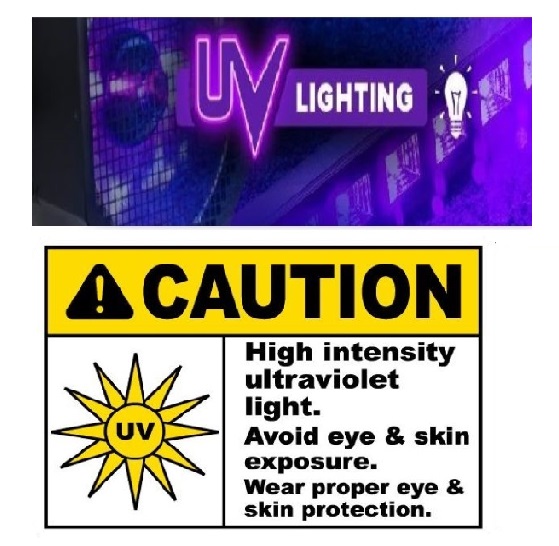4901 TUV GERMICIDAL FITTING DIECAST ALUMINIUM COME WITH PHILIPS TUV LAMP 16W WALL TYPE GERMICIDAL DISINFECTION LAMP SET. [PLUG & PLAY]
To disinection: Study room, offices, toilet, bedroom, corridors & public areas with air condition.
Any types of airborne bacterias & viruses in a ventilated room.
4901 TUV Air Sterilizer can sanitize the air within the room size.
Recommendation after change lamp PHILIPS TUV 16W, after 10,000 hrs.
FITTING CONSISTS OF PHILIPS TUV 16W LAMP, PHILIPS ELECTRONIC BALLAST & 5METERS OF CABLE WITH MK 13A PLUG TOP.

Low-pressure lamps are very similar to fluorescent lamp, with a wavelength of 253.7 nm (1182.5 THz).
The most common form of germicidal lamp looks similar to an ordinary fluorescent lamp but the tube contains no fluorescent phosphor. In addition, rather than being made of ordinary borosilicate glass, the tube is made of fused quartz or vycor 7913[1] glass. These two changes combine to allow the 253.7 nm ultraviolet light produced by the mercury arc to pass out of the lamp unmodified (whereas, in common fluorescent lamps, it causes the phosphor to fluoresce, producing visible light). Germicidal lamps still produce a small amount of visible light due to other mercury radiation bands.
Germicidal lamps are used to sterilize workspaces and tools used in biology laboratories and medical facilities. If the quartz envelope transmits wavelengths shorter than 253.7 nm, they can also be used wherever ozone is desired, for example, in the sanitizing systems of hot tubs and aquariums. They are also used by geologists to provoke fluorescence in mineral samples, aiding in their identification. In this application, the light produced by the lamp is usually filtered to remove as much visible light as possible, leaving just the UV light. Germicidal lamps are also used in wastewater treatment in order to kill microorganisms.
Short-wave UV light is harmful to humans. In addition to causing sunburn and (over time) skin cancer, this light can produce extremely painful inflammation of the cornea of the eye, which may lead to temporary or permanent vision impairment. It can also damage the retina of the eye.
For this reason, the light produced by a germicidal lamp must be carefully shielded against direct viewing, while reflections and dispersed light is not an issue. A February 2017 risk analysis of UV-C lights [2] concluded that ultraviolet light from these lamps can cause skin and eye problems.
TIPS ON HOW TO USE
Mount as high as possible on the wall, The light source should face up, not down. Leave a gap of 6inch- 12inch from the ceiling.
Room to be emptied of habitats, switch on air-cond, fans or any ventilation fans, let the airflow in the room circulating. Switch on GERMICIDAL light & it will automatically burn any germs that are flowing in the air. Leave the room immediately. Let it be for few hours then switch off the light or unplug it.
Make sure the lights or plugs are out of reach from children.
What is ozone and where is it in the atmosphere?
Ozone (O3) is a highly reactive gas composed of three oxygen atoms. It is both a natural and a man-made product that occurs in the Earth's upper atmosphere
(the stratosphere) and lower atmosphere (the troposphere). Depending on where it is in the atmosphere, ozone affects life on Earth in either good or bad ways.
Stratospheric ozone is formed naturally through the interaction of solar ultraviolet (UV) radiation with molecular oxygen (O2). The ''ozone layer,'' approximately 6 through 30 miles above the Earth's surface, reduces the amount of harmful UV radiation reaching the Earth's surface.
Tropospheric or ground-level ozone – what we breathe – is formed primarily from photochemical reactions between two major classes of air pollutants, volatile organic compounds (VOC) and nitrogen oxides (NOx). These reactions have traditionally been viewed as depending upon the presence of heat and sunlight, resulting in higher ambient ozone concentrations in summer months. Within the last decade, however, high ozone concentrations have also been observed under specific circumstances in cold months, where a few high elevation areas in the Western U.S. with high levels of local VOC and NOx emissions have formed ozone when snow is on the ground and temperatures are near or below freezing. Ozone contributes to what we typically experience as ''smog'' or haze, which still occurs most frequently in the summertime, but can occur throughout the year in some southern and mountain regions.
Although some stratospheric ozone is transported into the troposphere, and some VOC and NOx occur naturally, the majority of ground-level ozone is the result of reactions of man-made VOC and NOx. Significant sources of VOC are chemical plants, gasoline pumps, oil-based paints, autobody shops, and print shops. Nitrogen oxides result primarily from high-temperature combustion. Significant sources are power plants, industrial furnaces and boilers, and motor vehicles.
EX STOCK SUBJECT TO PRIOR SALES OR INDENT!
For more information, please kindly send us an inquiry.
np_code{type:tag_slider,id:39224,col:4}
 Malaysia
Malaysia